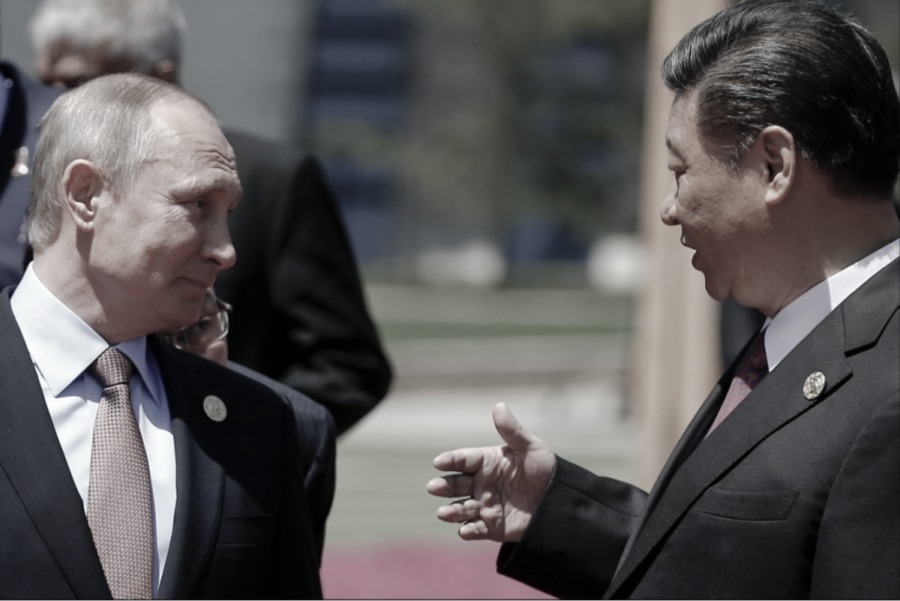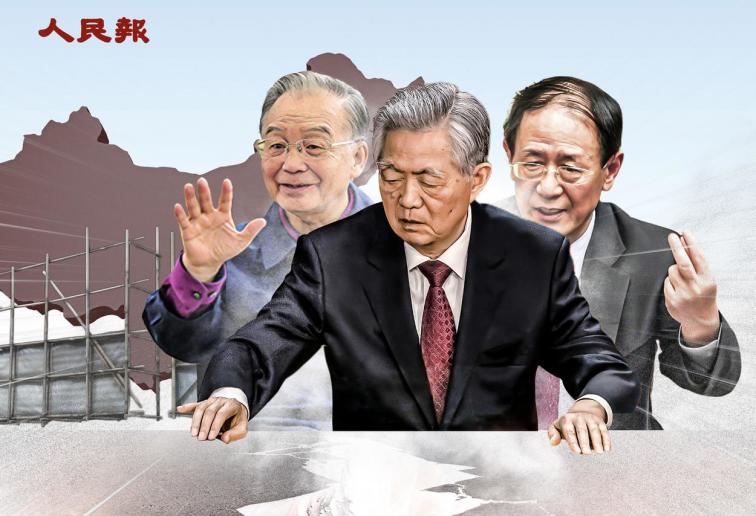File Photo: Putin and Xi Jinping Posing for a Photograph
[People News] In recent times, both domestic and international political circles have been intensely focused on the political climate in Zhongnanhai. On the program Wenzhao Talks History and Current Affairs, commentator Wen Zhao analysed that the Chinese Communist Party (CCP) is currently signalling a potential power transition involving Xi Jinping, while at the same time attempting to maintain an outward image of stability within the Party. The CCP is particularly worried about following in the footsteps of its “Big Brother,” the Soviet Communist Party, which fell into fierce internal power struggles before ultimately collapsing. The downfall of Soviet leader Nikita Khrushchev — who, like Xi Jinping, was seen as having limited formal education — offers a striking mirror reflecting Xi's trajectory.
After Stalin’s death in March 1953, the Soviet leadership briefly operated as a triumvirate made up of Lavrentiy Beria, Georgy Malenkov, and Nikita Khrushchev. Beria controlled the secret police and wielded considerable real power. Malenkov chaired the Council of Ministers (akin to being the Soviet Premier), while Khrushchev managed Party affairs.
Khrushchev ultimately prevailed because, on the one hand, he took a tough stance against the West, earning the military’s support, and on the other, he skillfully gained backing from most of the Party leadership. After holding power for 11 years, Khrushchev was ousted. Wen Zhao identifies three main reasons for his downfall:
1. Purge of the Military — Alienating the Armed Forces
Khrushchev, who had relied on military backing to defeat Beria and Malenkov, soon grew wary of the army's senior leaders. Once in power, one of his first actions was to reorganise the military:
In 1957, he dismissed WWII hero Marshal Georgy Zhukov as Defence Minister. He frequently rotated commanders across military districts and branches. He heavily invested in building the Strategic Rocket Forces, aiming to suppress the traditional dominance of the army. Although Khrushchev gained control of the military, his actions created deep resentment within its ranks.
2. Crackdown on Party Discipline — Alienating Party Elders and Officials
From the perspective of reform methodology, Khrushchev often implemented reforms based on his personal subjective wishes, relying on administrative orders to enforce them. Especially in the later period, as his leadership position became more secure, he grew increasingly autocratic, with a rising tendency toward voluntarism (rule by personal will).
Politically, Khrushchev's reforms involved massive personnel changes, infringing on the interests of many individuals. These changes were carried out without sufficient prior consideration or appropriate arrangements. For example, he sought to abolish the lifelong tenure of leading cadres and introduced a policy requiring the periodic replacement of a certain proportion of officials elected to Party leadership bodies (from local levels to the Central Committee). In each election, at least one-quarter of the Central Committee and its Praesidium members were to be replaced. In the 1962 elections, nearly 70% of deputies to the Supreme Soviet were changed. He also eliminated substantial monthly "allowances" for senior officials (such as provincial Party secretaries, Central Committee members, and newspaper editors), discontinued providing drivers for bureau-level cadres, and withdrew the privilege of having a car that could travel anywhere at will. His major reshuffling of personnel in the industrial and construction sectors led to widespread leadership turnover. All of these measures by Khrushchev clearly violated the interests of entrenched elites and, objectively, created a significant number of "political enemies" or "opponents."
Khrushchev was known to be crude, boastful, and emotionally volatile. Soviet politician Fyodor Burlatsky wrote that Khrushchev was “a victim not only of his environment, but of his own personality — impatient, impulsive, and excitable.”
During his rule, many Lenin-era elders were still alive. Khrushchev often treated these Bolshevik veterans with disrespect, earning their lasting enmity. Despite being retired, these elder statesmen still held significant influence and played crucial roles behind the scenes in uniting anti-Khrushchev forces.
3. Failures in Economic Reform — Agriculture and Industry Collapse
Khrushchev, born on April 17, 1894, in Kalinovka, Kursk Province of the Russian Empire, came from a poor peasant family. He only received four years of formal education before being forced to leave school due to poverty, making him, like Xi Jinping, a “primary school graduate” General Secretary.
He later took worker training courses and briefly studied at institutions like the Donetsk State Technical University and the Stalin Industrial Academy, though he never completed his education. Despite his limited academic background, he rose to the top politically, and his crude understanding of Marxism became a frequent topic of ridicule among international leaders.
In an attempt to address the Soviet Union’s chronically low agricultural yields, Khrushchev launched the infamous Corn Campaign, which earned him the nickname “Corn Maniac.” He initially saw success with corn cultivation in Ukraine in 1949, which impressed Stalin. But after taking power, Khrushchev aggressively promoted corn nationwide, hoping to emulate American agricultural success.
However, the Soviet Union’s colder climate and shorter daylight hours meant that vast areas were ill-suited for corn. The result was widespread crop failure. Far from increasing food output, the campaign devastated Soviet agriculture and deepened the country’s food crisis.
In industrial policy, Khrushchev tried to shift investment toward consumer goods to improve daily life — a reaction to the long-standing Soviet focus on heavy industry. While some progress was made, the underlying issue was the system itself. The centrally planned economy remained inefficient, and regardless of which sector received investment, shortages and losses were inevitable.
Since agricultural reform failed to deliver raw materials, the light industry suffered too. The dual failure of both sectors caused living standards to decline, further eroding Khrushchev’s support among middle- and lower-level officials.
Even though his centralised “national effort” approach initially showed some short-term success — such as expanding corn planting and increasing meat and dairy production — these achievements were unsustainable. They did not address the inefficiencies of the planned economy and came with severe side effects.
To please superiors and avoid punishment, officials falsified production numbers and took extreme actions. In Ryazan, for example, authorities slaughtered all livestock and bought meat nationwide to meet Khrushchev’s quotas — a disastrous policy.
In comparison, it is evident that Xi Jinping has followed almost every misstep made by Khrushchev. From purging the military and consolidating power, to pushing top-down reforms that alienate key elites, and launching economically damaging campaigns based more on ideology than practicality, the trajectory bears a striking resemblance.
While Khrushchev was ousted in a coup orchestrated by Party elders and internal opponents, observers now speculate whether Xi might face a similar fate. The question remains: will history repeat itself in Beijing?
Khrushchev Ousted Overnight
As time went on, the number of anti-Khrushchev conspirators grew, with the most notable figures being Leonid Brezhnev and CPSU Secretary Alexander Shelepin—both of whom had been promoted by Khrushchev himself. These individuals frequently gathered in secret, plotting how best to remove Khrushchev from power.
Brezhnev once proposed assassinating Khrushchev using various methods, but many disagreed, believing that assassination would cause too many complications afterwards. After numerous discussions, they settled on a plan: to sideline Khrushchev politically, launch a coup, and expel him from the Kremlin.
However, the success of the coup hinged critically on the support of the military. One individual would play a decisive role in this regard—the Soviet Minister of Defence, Rodion Malinovsky. If Malinovsky refused to support the coup, the efforts of the anti-Khrushchev faction would amount to little more than harmless agitation.
Previously, in an effort to cut costs, develop high-tech weaponry, and ease tensions with Europe, Khrushchev had pushed through massive reductions in the military—acting unilaterally. These actions, combined with Khrushchev’s already weak control over the armed forces, resulted in him gradually losing the military’s trust. In the end, Malinovsky threw his support behind the coup plotters.
On October 12, 1964, the CPSU Praesidium held a meeting in Khrushchev’s absence and unanimously voted to remove him from office. At that time, Khrushchev was vacationing peacefully on the shores of the Black Sea.
Having secured the military’s support, the anti-Khrushchev faction set a trap in Moscow. They replaced Khrushchev’s security detail and took full control of the Kremlin.
That evening, Brezhnev called Khrushchev and urged him to return to Moscow immediately for an emergency Praesidium meeting on agricultural issues. Though somewhat reluctant, Khrushchev boarded a plane early the next morning to fly back to Moscow.
What followed went exactly as planned. As soon as Khrushchev landed, he was placed under house arrest and escorted directly to the Kremlin by KGB agents.
On the afternoon of October 13, inside the CPSU Praesidium meeting room, Brezhnev and the other coup leaders launched their offensive. They accused Khrushchev of numerous serious errors during his ten years in power and claimed he had ideologically deviated from Marxism. Khrushchev was caught off guard by the sudden ambush and was completely powerless to resist. It was only then, like waking from a dream, that he realised the entire plot had been orchestrated by the very subordinates he had trusted most.
Khrushchev attempted to resist and change the outcome, but Brezhnev gave him no chance. In the end, Khrushchev had no choice but to accept his fate. The next morning, at 10 a.m., the Praesidium reconvened. Khrushchev signed a pre-prepared retirement statement citing illness and formally stepped down.
Reportedly, prior to the coup, Khrushchev’s son, Sergei, received a phone call warning that a group within the Party was conspiring to overthrow his father. Sergei immediately informed Khrushchev.
However, Khrushchev dismissed the warning as nonsense. He had immense trust in the very subordinates he had promoted, so instead of investigating the matter, he went on with his vacation at the Black Sea as planned.
After his retirement, Khrushchev’s later years were far from peaceful. He lived under constant surveillance by the KGB. Even writing his memoirs was forbidden, and he had to complete them in secret and smuggle them abroad, giving the world the Memoirs of Nikita Khrushchev. △










News magazine bootstrap themes!
I like this themes, fast loading and look profesional
Thank you Carlos!
You're welcome!
Please support me with give positive rating!
Yes Sure!